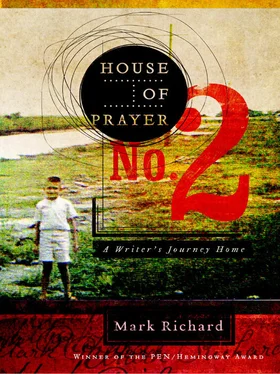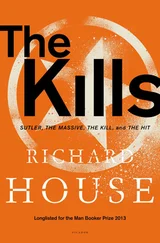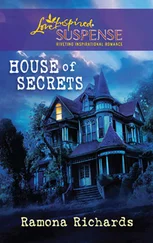There’s the blind man passing, the man who reupholsters furniture by touch, he comes tapping with his white and red cane, red-lidded, rolled-back eyes, a half smile, and even if you hold your breath, he turns his head and looks into your window, neatly raising his right foot to miss the place where the walnut tree has levered up the sidewalk to trip him in front of your house.
There goes one of the sisters who used to babysit you, the sisters sharing a bedroom in a house in the next block where one night a hand holding a screwdriver floated into their room through the punctured window screen between their beds. When the older sister used to babysit you, she used to draw moody pencil sketches of old rowboats rotting on chains in a cypress swamp.
There’s David’s father, The Preacher, getting into their ancient blue station wagon, pipe bitten down, himself nearly blind in one eye, a large enough man so you can hear him humming a hymn from two doors down and across the street. Lord, plant my feet on higher ground . You miss the parsonage where you spent as much time as you did in your own house before your hips happened, a place that always smelled like bacon and coffee, the old pages and leather of books about God and the Apostles, Virginia history, and places in the world where The Preacher intended to travel. The Preacher and his wife, Janet, are like your other parents, you being the fifth brother to the four sons they already have. The Preacher never holds it against any of you for being boys prone to mischief. Sometimes at The Preacher’s church the carillon goes off unexpectedly during the day, sometimes broadcasting “Chopsticks,” “Shave and a Haircut,” or the four-note opening of the Twilight Zone theme. Once one of his elder sons rummaged through his war loot and hung a three-story Nazi banner from the attic window on Flag Day, sending Mrs. Butler, the school music teacher, into a telephone pole when she saw it, you and David goose-stepping on the front sidewalk as an elder son Sieg Heiled from the attic window. And later, when you and David pin some children down in a garage, shooting them in their butts with David’s new BB gun, The Preacher comes home to where you and David are sitting on the porch and quietly asks to see the new rifle that he calmly wraps around a tree in the yard before going in to dinner. The Preacher says he did not believe in the concept of Original Sin until he had children.
The Saturday afternoon your father covers your window with thick grey plastic Mr. Panton two doors down is cutting his grass with the town’s only electric lawn mower. It is late fall and the rye-grass is lush and the sun is leaving early. Your house is cold and drafty, and your father is stapling plastic on the window frames. He is a black shadow on the plastic outside your window and you’re glad you’re not having to hold the ladder so he can climb to the second-story windows because you never hold the ladder just right. Once, when he almost fell, you’d let go so he wouldn’t land on top of you. Mr. Panton’s eyesight is poor and he has run over the cord to his electric lawn mower so many times that the cord is forever shortened in electrical tape splicings. He can’t reach the far corners of his yard anymore. You hear Mr. Panton run over his cord again in the dusk. Your father’s shadow moves off and your grey window to the world fades to black.
The next morning will be Sunday, and your father will load you into the back of the station wagon and take you back to Richmond.
WHEN THEY CUT YOU OUT of your cast, you are surprised there are no bugs inside, but your legs have atrophied into two long hairy sticks of rotting flesh. You can scrape hair and dead skin off the bone with your fingernail. Later you hear that doctors think leaving children in body casts for a long time is not a good idea.
They wheel you down to the ward, and it’s been cleft palate season. There are a lot of children running around with complicated black stitchery on their upper lips. Some look like little Hitlers, others look like black-whiskered cats. They put you on the big sunporch with some older black boys, and you’re glad to find Michael Christian. Nurse Wilfong comes to see you and says how you’ve grown, must have been your mama’s cooking, and you look toward the little sunporch and ask where Jerry is, and she holds your face in her hands and bends over and says, Jerry died .
Out on the big sunporch it’s cold at night. The older black boys are all from Richmond. There’s Dennis in the corner bed. He keeps saying, I used to be smart but then I got a brain tumor and now I’m stupid . The little boys tease him and if they get too close he’ll strike at them with palsied arms and try to strangle them. Michael Christian inherited your old transistor radio from Big Mike when Big Mike left but the nurses have taken it away from him. There’s a black boy named Columbus Floyd who looks like an old man already bent over a cane waiting to be taken upstairs. You nickname him Chris and he likes it. He doesn’t want to learn how to play chess, but he’ll play checkers with you for hours and you never win a single game. He keeps the little boys away from Dennis’s bed, they’re afraid of his cane.
They take you to physical therapy to teach you to walk again. There are no muscles left in your legs, and if it weren’t for Charles, the black PT assistant, holding you up with a belt looped under your arms, you would fall more than you do. There’s a new physical therapist who takes your extended atrophied leg over the edge of a padded table and then pushes it down so hard he tears something in your leg and you scream and pound on his back with your fists until Charles comes over and says, What the hell you doing, man? The new guy doesn’t work there much longer.
The woman who replaces him performs a miracle on a boy from Appalachia. The boy has never walked a step in his life. He lives in his wheelchair and is old enough to masturbate furiously all the time under a blanket, then he asks a nurse to clean him up. He only sleeps in his wheelchair; when they put him in bed, he’s frozen in the wheelchair position and says all night out loud, keeping everyone awake, My legs are tighter than a cork in a bottle, my legs are tighter than a cork in a bottle . So the night nurse and Ben have to lift him down into his wheelchair, where he masturbates himself to sleep.
The new physical therapist and Charles soak the boy in a stainless steel vat of hot water and massage his legs and back for hours. Charles gets the boy up on crutches and he is surprisingly tall. He has a way of talking that sounds like a female cat yowling when she is mounted by a tom and the tom has his teeth in her neck. Everyone is a little frightened of the boy now that he is on crutches. He follows people a little too closely like he would like to kick their crutches out from under them. When he can finally walk just using a cane, a woman and two men from Appalachia come to get him. If they are related to him or to each other, it is hard to see. They feel like the people who once tried to get David into a car with North Carolina license plates the Saturday afternoon you were in a part of town you were not supposed to be in, which is why you never told your parents. These people from Appalachia come to fetch the tall boy with an old beat-up wheelchair that he happily sits in when he sees it. When the nurses say he can walk now, he doesn’t need the wheelchair, it’s a miracle, the people mock the nurses and run out of the place pushing the boy laughing ahead of them. One of the men looks back, and his look dares anyone to follow.
By Christmastime, all the black boys on the big sunporch have been cut up and nailed back together. When their families come to visit, it is like a party. Often they come from church in their church clothes, and they have real fried chicken and they always make you a plate. Sometimes their preachers come with them, and their preachers pray over the boys and they’ll pray over you if they catch you looking and you’re always looking, so they pray over you, too.
Читать дальше













